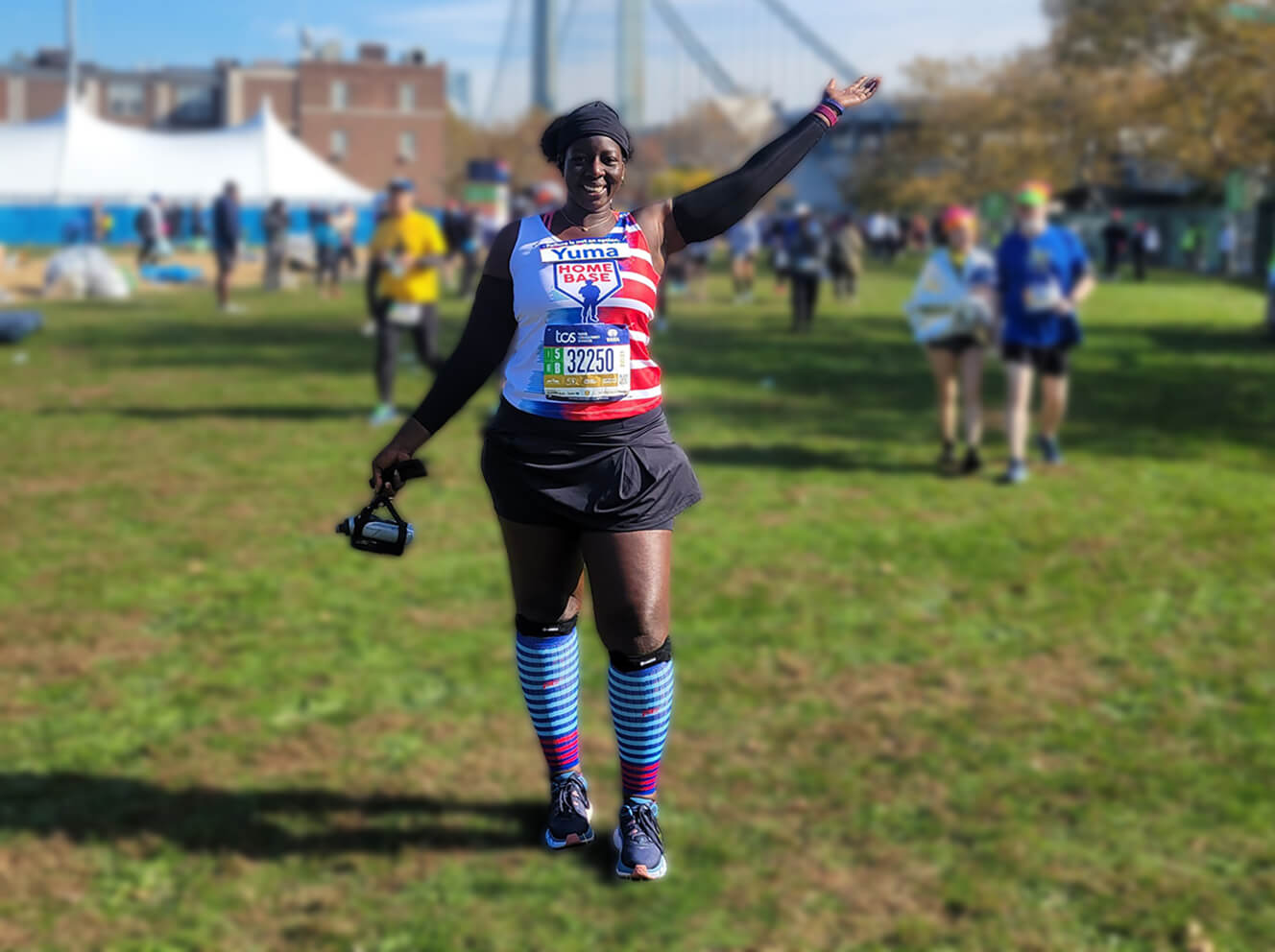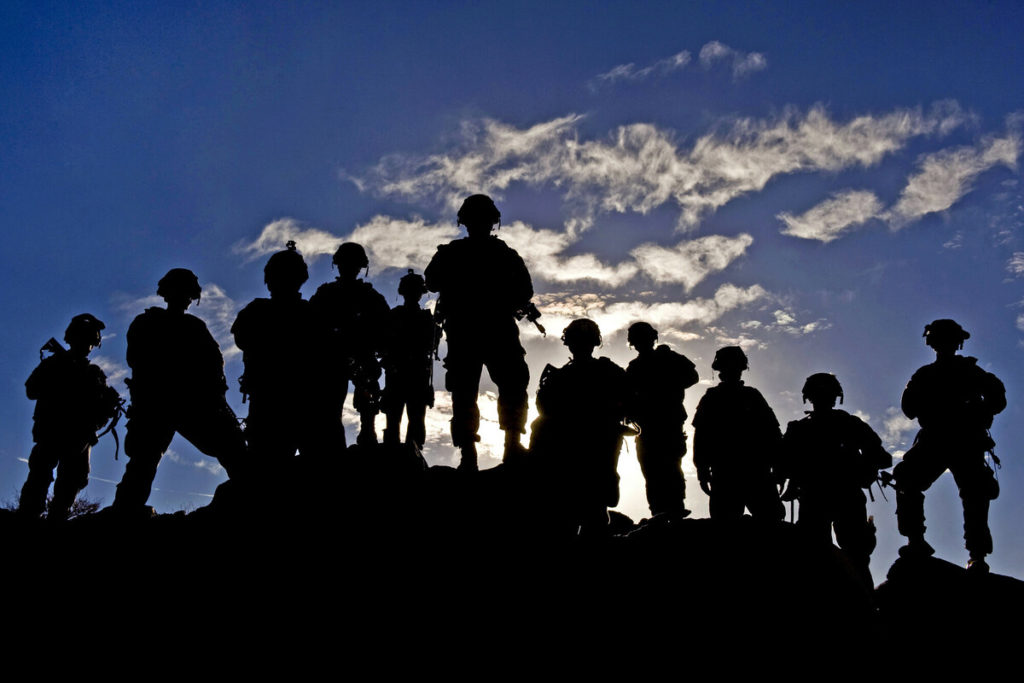Marathon training is marked by numbers, as runners track their training runs, count down the weeks left before the race, anticipate the time it will take them to complete the 26.2-mile course and more. Yuma Haidara will have a few other numbers on her mind when she runs her first Boston Marathon® this April. Seven, for the total number of marathons she’ll have under her belt when she crosses the finish line. Five, for the number of close friends who served with her in the U.S. Navy and who she lost to suicide. Two, for the number of weeks Yuma spent at the Home Base Program, which offers mental health programs to support Veterans like her who suffer from the invisible scars of war.
The numbers all play a role in Yuma’s decision to run the Boston Marathon to raise funds for Home Base — a program founded by Massachusetts General Hospital and the Red Sox Foundation that is dedicated to healing the invisible wounds of war for Veterans of all eras, Service Members, Military Families and Families of the Fallen. By drawing attention to mental health for Veterans, Yuma hopes others can find the healing that she did.
“That transition period is so hard — there isn’t a lot of support available and the civilian world doesn’t recognize what you’ve done. That’s a huge downfall, and it’s why many people fall into depression and anxiety. There’s a lot of pressure to get back to the real world and act like nothing happened.”
“I know how important this is,” Yuma says. “Sometimes I feel like my voice is so small, and I just want to scream from the rooftops. But even if I reach just one person, it’s worth it.”
The Difficult Transition Back Home
Yuma joined the U.S. Navy in 2007. She had been part of the Junior Reserve Officers’ Training Corps (JROTC) program at her New Hampshire high school and enjoyed the structure, so she saw the military as a way to get on her feet after high school and avoid college debt. Her deployments took her to Iraq and Afghanistan as a Seabee — the Navy’s cadre of builders — and she finished her service in 2014.
“As a builder, I was skilled in concrete and carpentry, and I was running million-dollar projects. When I got back, all that experience meant nothing,” Yuma says. “It was an eye-opener. That transition period is so hard — there isn’t a lot of support available and the civilian world doesn’t recognize what you’ve done. That’s a huge downfall, and it’s why many people fall into depression and anxiety. There’s a lot of pressure to get back to the real world and act like nothing happened.”
Yuma’s first experience with Home Base came through Veterans On The 48, a hiking group she joined after coming home. The group participated in the annual Run to Home Base one year, and when the Veterans on the 48 president asked Yuma to run the New York City Marathon to further support Home Base, she said yes. At a charity dinner the night before the race, a fellow Veteran sitting with her shared his experience of going through the program. Yuma believed that her problems paled in comparison to other Veterans, but “he gave me a number and told me to get myself into the program.”
“I wasn’t alone.”
A few weeks after running New York, Yuma found it difficult to get out of bed each morning. “I remember feeling heavy all the time, like the weight of the world was on my shoulders and I couldn’t push it off,” Yuma says. “The longer I felt that way, the deeper the hole got.”
She called Home Base and told them she needed help now.
“Home Base doesn’t drop you after you’re done. They’ve always been ready to give me a solution on the spot. It’s comforting to know there’s no time limit on the help you receive from them.”
The team at Home Base got her into a two-week program in February 2022, providing her with mental health resources, therapy, a structured routine that held her accountable and a supportive group of fellow Veterans who shared her struggles.
“They made me show up for myself, which I really needed,” Yuma says. “I was in a room with 11 other people who also really needed this program, which made me feel like I wasn’t alone in dealing with this. At Home Base, I realized I could get through this difficult period.”
Enduring Connections, Consistent Support
The Home Base staff stayed connected to Yuma after she finished the program. When she felt like she was spiraling after news of another friend’s suicide, she called Home Base and they placed her in an intensive outreach program at home in New Hampshire. The program also connected her with a nearby therapist so she could continue to receive the support she needed.
“Home Base doesn’t drop you after you’re done,” Yuma says. “They’ve always been ready to give me a solution on the spot. It’s comforting to know there’s no time limit on the help you receive from them.”
That support is what will run through Yuma’s mind during the miles from Hopkinton to Copley Square, as she reminds herself about the bigger picture of this race for her.
“When I ran in New York, I ran for my fellow Veterans, and that was a really emotional thing,” Yuma says. “This year, I’m running for me.”
To support Yuma’s fundraising efforts for Home Base, click here.
To learn more about Mass General’s marathon team, click here.
John Hancock-Mass General Boston Marathon® Partnership
Mass General is proud to be an official Partner of John Hancock in the Marathon Non-Profit Program. The Non-Profit Program provides more than 1,000 Boston Marathon® bibs to select non-profit organizations throughout the community, giving an opportunity to all to raise significant funds to advance their missions.
For 26 years, John Hancock has been our steadfast partner in the Marathon Non-Profit Program and with their support, we have raised more than $22 million for Mass General. We are deeply humbled and profoundly grateful for their longstanding dedication to our mission. Their trust in us helped us reach this pivotal moment in medicine, a moment that allows us now to reimagine the future of health care for all people, both locally and around the globe. Learn more about our John Hancock-Mass General Boston Marathon partnership that continues to provide significant support for our three signature causes: Pediatric Cancer, Emergency Medicine and Home Base.

